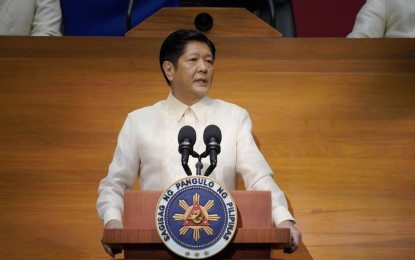Mobile Heaser

PBBM’s West Philippine Sea stand: ‘Filipinos do not yield’

MANILA – Amid continued provocations by the China Coast Guard (CCG) and numerous diplomatic protests from the Philippines, President Ferdinand R. Marcos Jr. delivered a resolute message before foreign delegates at the IISS Shangri-La Dialogue 2024 in Singapore held from May 31 to June 2 last year.
“I do not intend to yield. Filipinos do not yield.”
Reaffirming his firm stance on the West Philippine Sea (WPS), President Marcos also declared:
“I will not preside over any process that will abandon even a square inch of territory of the Republic of the Philippines.”
Despite the 2016 ruling by the Permanent Court of Arbitration under the United Nations Convention on the Law of the Sea (UNCLOS)—which invalidated China’s sweeping maritime claims and its so-called 10-dash line, the CCG has continued to escalate its harassment of Philippine Coast Guard (PCG) personnel, Navy sailors, and Filipino fishermen.
China’s persistent operations in the WPS remain unlawful under international law.
‘Our Seas, Our Rights, Our Future’
In line with the President’s declaration, the Armed Forces of the Philippines (AFP) has launched Communication Plan (COMPLAN) Mulat, an initiative designed to bolster transparency, counter disinformation, and enhance public awareness of the Philippines’ rights over its maritime territory.
On July 4, 2024, AFP Chief of Staff General Romeo Brawner Jr. announced COMPLAN Mulat during the military’s mid-year command conference with President Marcos.
Derived from the Filipino word “mulat”, meaning “aware”, the campaign seeks to combat false narratives and misleading propaganda that attempt to undermine the country’s sovereignty in the WPS. It is anchored on the new AFP theme: “Our Seas, Our Rights, Our Future.”
Brawner also warned the public of “united front works”—coordinated efforts to sow division among Filipinos and weaken national resolve.
“These efforts seek to spread panic, divide our nation, and distract us from pressing issues that demand our collective attention,” Brawner said.
Department of National Defense (DND) Assistant Secretary for Defense Communications and Spokesperson Arsenio Andolong echoed this warning, stressing the need for heightened public awareness.
“There are malicious narratives that twist the truth. Fake news peddlers are adept at malign influence, and their goal is to weaken national unity, disrupt our quality of life, and erode our political and economic stability,” Andolong emphasized.
‘Tatag Kapuluan’: Strengthening Territorial Defense
As part of a broader national defense strategy, the AFP introduced ‘Tatag Kapuluan’ on Dec. 20, 2024, during its 89th founding anniversary.
This initiative represents the military’s latest and most refined approach to securing Philippine sovereignty in the Indo-Pacific region, particularly in the WPS.
“Protecting our maritime territory means ensuring that our fishermen can fish freely and that our trade routes remain secure,” Brawner emphasized.
‘Tatag Kapuluan’ envisions a resilient and secure archipelago through synchronized and holistic national efforts, strengthening the country’s ability to defend its waters and coastlines.
Comprehensive Archipelagic Defense Concept
Another significant defense initiative under the DND is the Comprehensive Archipelagic Defense Concept (CADC), which expands the country’s assets and capabilities to protect its entire Exclusive Economic Zone (EEZ).
Andolong explained that CADC—a flagship program of President Marcos’ administration and championed by Defense Secretary Gilberto Teodoro—will enhance the military’s capacity to safeguard the nation’s maritime domain.
“With CADC, we are strengthening our ability to defend our territory, reaching even the outermost edges of our EEZ and extended continental shelves,” the DND spokesperson stated in an exclusive interview with the Philippine News Agency.
Defense Secretary Gilbert Teodoro added that CADC broadens the scope of defense operations, covering the entire 360-degree maritime expanse surrounding the Philippines’ archipelagic baselines.
“We are investing in deterrence to guarantee our security. We are also expanding our reach,” Teodoro said.
Upholding sovereignty: Regular resupply missions and defiant stance on BRP Sierra Madre
A critical component of the AFP’s strategy is the regular rotation and resupply (RoRe) missions to BRP Sierra Madre in Ayungin Shoal—a move that underscores the Philippines’ unwavering assertion of its sovereign rights.
On August 29, 2024, Brawner affirmed the AFP’s commitment to these operations.
“We will exhaust all means possible, and we will do it on our own first. Kaya natin ito (We can do this),” he declared, emphasizing the AFP’s capability to carry out these missions independently, without relying on allies.
He also highlighted the military’s adaptability, citing past missions where troops successfully delivered supplies via aircraft when maritime routes were blocked by Chinese interference.
Meanwhile, President Marcos has repeatedly debunked claims that the BRP Sierra Madre will be removed from Ayungin Shoal.
On Aug. 9, 2023, he firmly stated, “I know of no agreement to move our ship from our own territory.”
‘Filipinos shall not yield’
Despite continuous harassment and diplomatic protests, China remains defiant in the WPS.
However, as President Marcos has reiterated: “Filipinos shall not yield.”
Standing at the forefront of this national fight are the PCG, Philippine Navy, AFP, and the country’s resilient fishermen—the true guardians of the Philippines’ maritime heritage.
With strategic defense initiatives, transparency efforts, and a renewed commitment to territorial integrity, the Philippines is forging a stronger stance in safeguarding its sovereign waters.
‘Morale Booster’ for the Philippine Coast Guard
Meanwhile, the PCG, through the National Task Force – West Philippine Sea (NTF-WPS), has been at the forefront of exposing Chinese harassment in the WPS through its transparency initiative—a move that has significantly boosted the morale of personnel defending Philippine waters.
Before the Marcos administration, West Philippine Sea Spokesperson Commodore Jay Tarriela revealed that PCG personnel often felt “disappointed and humiliated” when facing Chinese intimidation in the WPS.
“Their efforts were not even recognized by the government. People were made to believe that everything was going smoothly in the WPS,” Tarriela said.
But with President Marcos actively supporting transparency efforts, Tarriela noted a shift in public perception.
“When President Marcos first addressed this issue in his State of the Nation Address, the challenge was to convince the Filipino people to support this cause. Now, nearly two years later, we are seeing a positive impact,” Tarriela said.

